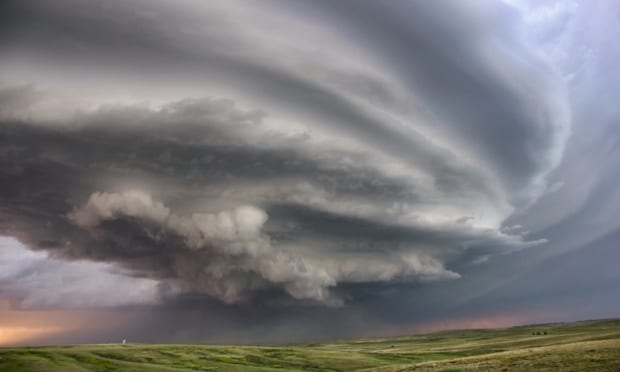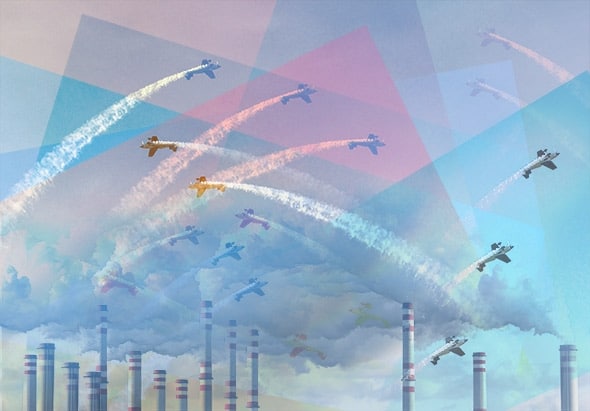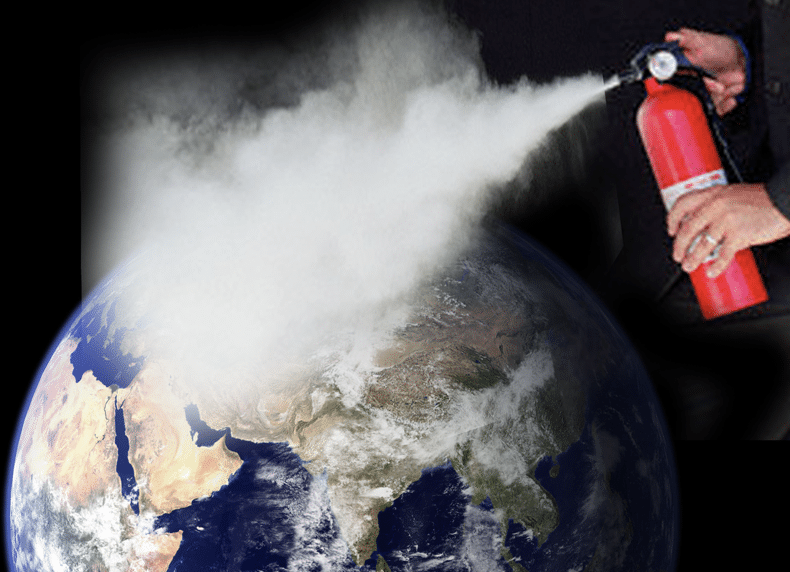A leading climate-change scientist has warned that the US secret service’s interest in geoengineering technology may not be benign. But it’s not the first time a government has tried to control weather patterns by Patrick Barkham (Guardian) Using the weather as a...
Geoengineering Technologies
Climate Hacking Is Barking Mad
You can’t fix the Earth with these geoengineering proposals, but you can sure make it worse. by Raymond T. Pierrehumbert (Slate) Some years ago, in the question-and-answer session after a lecture at the American Geophysical Union, I described certain geoengineering...
Plan B? What Happened to Plan A?
Why we shouldn’t fund geoengineering experimentation, and what we still need to learn about the climate by Pat Mooney (ETC Group) The US National Academy of Sciences has released two reports on geoengineering that recommend investments in solar radiation management...
From the Concorde to Sci-Fi Climate Solutions
by Almuth Ernsting (Truthout) Touting "sci-fi climate solutions" - untested technologies not really scalable to the dimensions of our climate change crisis - dangerously delays the day when we actually reduce greenhouse gas emissions. Last week, I took my son to...
Is geoengineering research going outdoors?
by Blaž Gasparini and Prof. Ulrike Lohmann Geoengineering research has so far been confined to modelling and laboratory studies. Serious research outside of these limits has been a taboo because of the serious risks this may pose for ecosystems and society. However,...
China sets 2020 “artificial weather” target to combat water shortages
BEIJING, Jan 13 (Reuters) - China aims to induce more than 60 billion cubic metres of additional rain each year by 2020, using an "artificial weather" programme to fight chronic water shortages, the government said on Monday. China's water resources are among the...
‘Climate hacking’ would be easy – that doesn’t mean we should do it
by Erik van Sebille and Katelijn Van Hende Some people might argue that the greatest moral challenge of our time is serious enough to justify deliberately tampering with our climate to stave off the damaging effects of global warming. Geoengineering, or “climate...
The Myth of Net-Zero Emissions
by LILI FUHR and NICLAS HÄLLSTRÖM BERLIN – The emissions from burning coal, oil, and gas are heating up our planet at such a rapid rate that increasingly volatile and dangerous climate conditions seem almost inevitable. Clearly, we have to reduce emissions fast, while...
Reflecting sunlight into space has terrifying consequences, say scientists
But ‘geoengineers’ say urgent nature of climate change means research must continue into controversial technology to combat rising temperatures This was originally published by the Guardian by Damian Carrington Fighting global warming by reflecting sunlight back into...
“Uncertainties” is an understatement when it comes to BECCS
[This article was originally posted to the Washington Geoengineering Consortium] by Rachel Smolker In 2012, Biofuelwatch published a report titled “Bioenergy with carbon capture and storage: Climate savior or dangerous hype?” We had long been working to reveal and...
Intergovernmental Climate Report Leaves Hopes Hanging on Fantasy Technology
by Rachel Smolker This year, the Intergovernmental Panel on Climate Change (IPCC) has confirmed for us, once again, that the planet is warming, even more and even faster than panel members thought. In fact, it is getting even warmer even faster than they thought the...
Five facts CBC listeners didn’t hear from Canada’s geoengineering cheerleader
What’s missing from David Keith’s climate change charm offensive by Jim Thomas This article was originally published by the Media Co-op. Last Sunday, CBC listeners across Canada enjoyed their morning coffee and took care of a few chores around the house while the...
Where’s the Lorax When We Need Him?
It's a shame that the Lorax and his message "Who Will Speak For The Trees" has been relegated to the realm of children's cartoons and fantasy. Especially as trees, forests and ecosystems appear to be right smack in the epicenter of swirling debates about climate...
Geoengineering The Sky is Not ‘Normal’
by Rachel Smolker In the wake of the climate negotiations in Warsaw, the consensus appears near universal: the international process is not going to deliver, and it is up to countries and communities to go it on their own. For some, that means taking serious and...
Biochar: Black Gold or Just Another Snake Oil Scheme?
by Rachel Smolker In an interview with Naomi Klein, published in the Autumn 2013 issue of Earth Island Journal, she referred to the American fondness for “win-win solutions.” I had to giggle, having on many occasions sat in on industry-led events, where the speakers,...
Science or propaganda? New hype about Bioenergy with Carbon Capture and Storage
A new article published in Environmental Research Letters has made media headlines such as “Burning trees ‘may help global warming”. It is not unknown for the media to hype up and even misrepresent announcements by scientists, but in this case, the authors’ own press...
Another study reveals dangers of geoengineering through ‘iron fertilisation’
Yet another study questions shows how dangerously simplistic the assumption that dumping iron filements into oceans will sequester carbon is. This latest study, by Ellery D. Ingall et al, published in Nature Communications, looks at a particular type of...
Tree plantations and bioenergy with carbon capture: far from “safe” geoengineering
Amongst geoengineering methods, ‘afforestation’, Bioenergy with Carbon Capture and Storage (BECCS) and biochar are commonly promoted as ‘safe’, benign’ or ‘soft’ options – unlike, say, shooting sulphur particles into the stratosphere. According to a 2011 report by...
Don’t Dump Iron — Dump Rogue Climate Schemes
The press release had a pretty stark headline: “Haida Announce Termination of Russ George.” If the name sounds familiar its because he is the Californian businessman who last year led the world’s largest, and unapproved, geoengineering (climate manipulation) scheme to dump over 100 tonnes of iron into the Pacific ocean west of Haida Gwaii in British Columbia…
B.C. village’s ocean fertilization experiment probed
Environment Canada investigating after iron-rich dust dumped off coast Fifth Estate (CBC) Environment Canada's enforcement branch has executed search warrants in British Columbia as part of an investigation into a controversial iron-fertilization experiment that took...
Geoengineering Is a Dangerous Solution to Climate Change
by Rachel Smolker As the realities of global climate change become ever more alarming, advocates of technological approaches to "geoengineer" the planet's climate are gaining a following. But the technologies that are promoted -- from spraying sulphate particles into...
Greatest risk of ocean experiment is that it will spawn more
by Dene Moore (Postmedia News) VANCOUVER - A small British Columbia First Nation making waves around the world with a controversial experiment in the Pacific Ocean is on the front lines of climate change, even critics admit. And as the fears of global warming grow,...
Iron Ocean Dump Greatest Risk Is Haida Salmon Boom: Critic
by Dene Moore (Canadian Press) VANCOUVER - A small British Columbia First Nation making waves around the world with a controversial experiment in the Pacific Ocean is on the front lines of climate change, even critics admit. And as the fears of global warming grow,...
A Brief Primer on Ocean Fertilization in the CBD and the London Convention and Protocol
by Duncan E.J. Currie LL.B. (Hons) LL.M. This briefing outlines the principal decisions and resolutions of the Convention on Biological Diversity and London Convention/Protocol relating to ocean fertilization in the context of the Haida Salmon Restoration...



